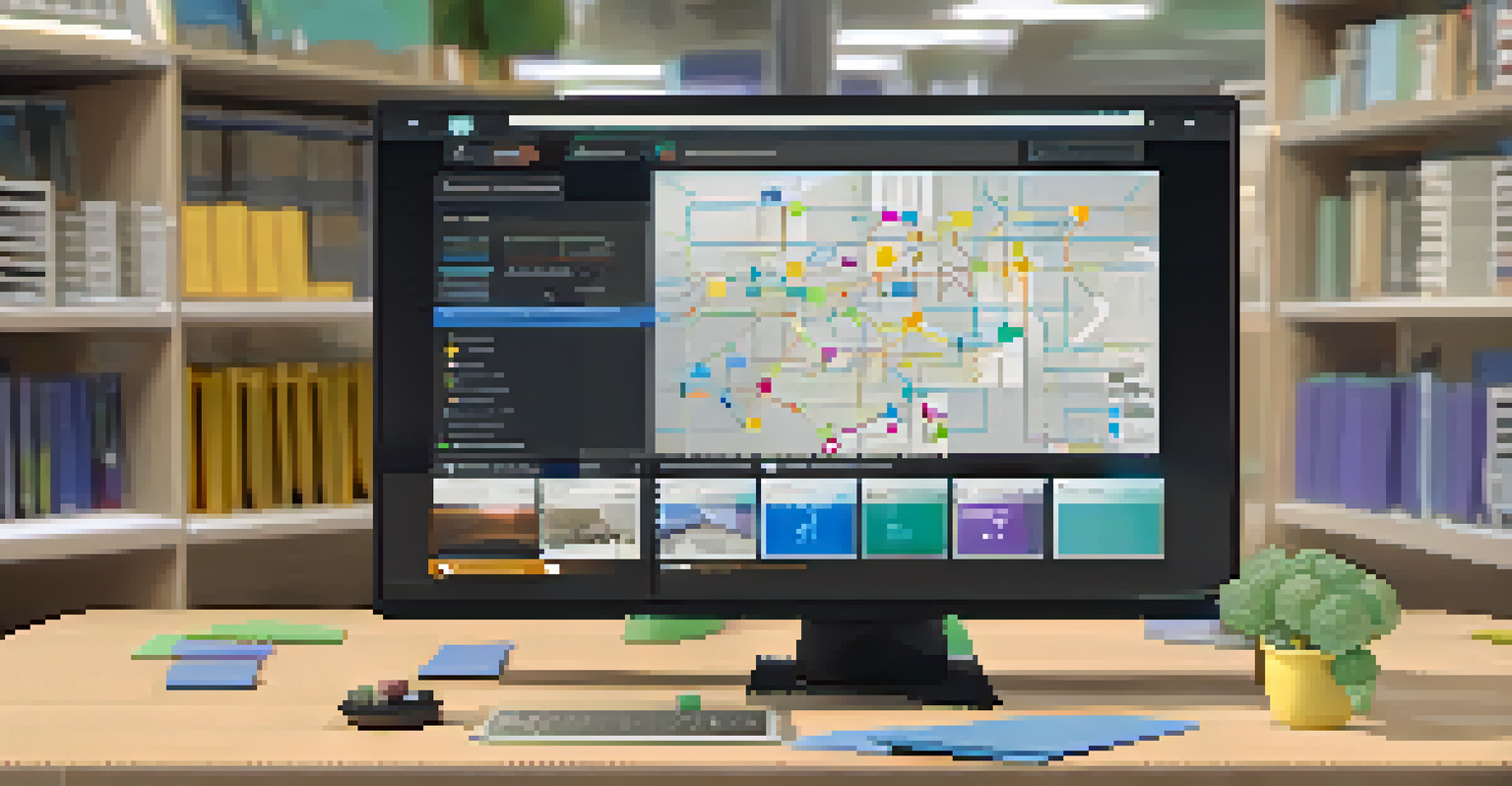The Future of Inquiry-Based Learning in a Digital Age

Understanding Inquiry-Based Learning in Today’s Context
Inquiry-based learning (IBL) encourages students to ask questions and explore topics deeply. This approach shifts the focus from rote memorization to critical thinking, fostering a love for learning. In today's educational landscape, IBL enables learners to engage actively, making their educational journey more personal and meaningful.
Inquiry-based learning is a dynamic classroom approach in which students actively explore real-world problems and challenges, allowing them to acquire deeper knowledge.
As students navigate through complex problems and real-world scenarios, they develop essential skills such as problem-solving and collaboration. These skills are increasingly important in our fast-paced, technology-driven society. By centering education around inquiry, we prepare students not just to absorb information, but to become innovators and thinkers.
In a digital age, the principles of IBL are more relevant than ever. With the internet at their fingertips, students can access vast resources, enabling them to pursue their inquiries with enthusiasm and depth. This newfound accessibility transforms traditional learning environments into vibrant hubs of exploration.
The Role of Technology in Enhancing Inquiry-Based Learning
Technology plays a pivotal role in facilitating inquiry-based learning. Digital tools, such as interactive simulations and online research databases, provide students with diverse resources to fuel their curiosity. These platforms not only enhance engagement but also encourage collaboration among learners, regardless of geographical boundaries.

For instance, virtual labs allow students to conduct experiments that may be too costly or dangerous in a traditional setting. This hands-on experience deepens understanding and reinforces scientific concepts. Additionally, online forums and collaborative projects enable students to share insights and learn from one another, fostering a sense of community.
Inquiry-Based Learning Enhances Engagement
Inquiry-based learning encourages students to actively explore topics, fostering critical thinking and a love for learning.
Moreover, adaptive learning technologies can tailor educational experiences to individual needs, ensuring that every learner can pursue their inquiries at their own pace. By embracing these innovations, educators can create dynamic learning environments that inspire students to explore and discover.
Challenges of Implementing Inquiry-Based Learning Digitally
While the benefits of inquiry-based learning in a digital age are clear, challenges remain. One significant hurdle is ensuring that all students have equal access to technology and the internet. Without this access, the gap between learners can widen, undermining the very principles of equity and inclusion that IBL aims to promote.
The great use of a life is to spend it for something that will outlast it.
Additionally, teachers may need to shift their traditional teaching strategies to embrace inquiry-based methods fully. This transition can be daunting, as it requires educators to become facilitators rather than mere providers of knowledge. Professional development and support are crucial to help teachers navigate these changes effectively.
Lastly, there's a risk of information overload in the digital landscape. Students might struggle to discern credible sources from unreliable ones. This emphasizes the importance of teaching critical evaluation skills alongside inquiry, ensuring that students can navigate the wealth of information available online.
The Importance of Teacher Training in IBL
Effective inquiry-based learning hinges on well-prepared educators. Professional development programs that focus on IBL methodologies can equip teachers with the necessary skills and confidence to foster inquiry in their classrooms. By understanding the principles of IBL, teachers can create engaging learning environments that spark curiosity.
Moreover, ongoing support and collaboration among educators can enhance the implementation of IBL strategies. By sharing best practices and resources, teachers can learn from one another and refine their approaches. This collaborative spirit not only benefits individual educators but also strengthens the entire school community.
Technology Supports IBL Implementation
Digital tools and resources enhance inquiry-based learning by providing diverse avenues for exploration and collaboration.
As teachers embrace inquiry as a central pedagogical approach, they can inspire students to take ownership of their learning. This empowerment is crucial in developing lifelong learners who are not afraid to ask questions and seek answers, a skill that is invaluable in any field.
Creating an Inquiry-Based Culture in Schools
To fully realize the potential of inquiry-based learning, schools must cultivate a culture that values curiosity and exploration. This cultural shift involves encouraging students to ask questions, take risks, and pursue their interests passionately. When students feel safe to express their ideas, they are more likely to engage deeply with their learning.
Administrators play a vital role in fostering this culture by supporting innovative teaching practices and providing necessary resources. By prioritizing inquiry in school policies and initiatives, leaders can set the tone for a more engaging and dynamic learning environment. This top-down approach ensures that inquiry is embedded within the school's ethos.
Additionally, involving parents and the community in the inquiry process can further enrich the learning experience. When students see the relevance of their inquiries in real-world contexts, they are motivated to explore further and make meaningful connections outside the classroom.
The Future of Assessment in Inquiry-Based Learning
As inquiry-based learning evolves, so too must our approaches to assessment. Traditional testing methods often fail to capture the depth of understanding that IBL promotes. Instead, alternative assessment strategies such as portfolios, presentations, and peer evaluations can provide a more holistic view of student learning.
These methods allow students to showcase their inquiries and demonstrate their learning journey. By reflecting on their processes and outcomes, students develop metacognitive skills that enhance their understanding of their learning styles and strengths. This self-awareness is crucial for their ongoing development.
Teacher Training is Essential for IBL
Effective inquiry-based learning relies on well-trained educators who can facilitate student curiosity and guide exploration.
Furthermore, technology can facilitate more personalized and formative assessments. Digital tools can provide real-time feedback, enabling students to adjust their learning paths as needed. This shift towards a more flexible assessment model aligns perfectly with the principles of inquiry-based learning.
Looking Ahead: The Evolution of Inquiry-Based Learning
As we look to the future, the evolution of inquiry-based learning in a digital age promises exciting possibilities. With advancements in technology and pedagogy, the potential for enhancing student engagement and understanding is immense. Future classrooms may resemble collaborative labs more than traditional lecture halls, where students are encouraged to explore and innovate.
Moreover, the integration of artificial intelligence and machine learning could offer personalized learning experiences tailored to each student's inquiries. Imagine AI-driven platforms that recommend resources or suggest inquiry paths based on students' interests and progress. This could revolutionize how learners interact with content and deepen their understanding.

Ultimately, the future of inquiry-based learning lies in the balance between technology and human connection. As educators, we must harness these tools while fostering relationships that inspire curiosity and critical thinking. By doing so, we can prepare our students to thrive in an ever-changing world.